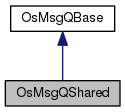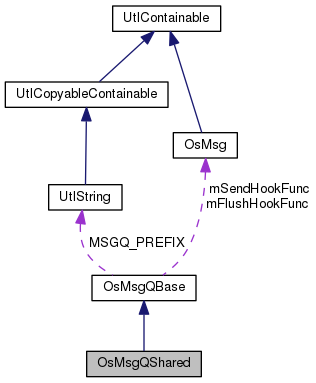#include <OsMsgQShared.h>


Public Member Functions | |
| OsMsgQShared (const int maxMsgs=DEF_MAX_MSGS, const int maxMsgLen=DEF_MAX_MSG_LEN, const int options=Q_PRIORITY, const UtlString &name="") | |
| Constructor. More... | |
| virtual | ~OsMsgQShared () |
| Destructor. More... | |
| virtual OsStatus | send (const OsMsg &rMsg, const OsTime &rTimeout=OsTime::OS_INFINITY) |
| Insert a copy of the message at the tail of the queue. More... | |
| virtual OsStatus | sendNoCopy (OsMsg *pMsg, const OsTime &rTimeout=OsTime::OS_INFINITY) |
| Insert an original of the message at the tail of the queue. More... | |
| virtual OsStatus | sendUrgent (const OsMsg &rMsg, const OsTime &rTimeout=OsTime::OS_INFINITY) |
| Insert a copy of the message at the head of the queue. More... | |
| virtual OsStatus | sendFromISR (OsMsg &rMsg) |
| Insert a copy of the message at the tail of the queue with ISR flag. More... | |
| virtual OsStatus | receive (OsMsg *&rpMsg, const OsTime &rTimeout=OsTime::OS_INFINITY) |
| Remove a message from the head of the queue. More... | |
| virtual int | numMsgs () |
| Return the number of messages in the queue. More... | |
 Public Member Functions inherited from OsMsgQBase Public Member Functions inherited from OsMsgQBase | |
| OsMsgQBase (const UtlString &name) | |
| Constructor. More... | |
| virtual | ~OsMsgQBase () |
| Destructor. More... | |
| virtual void | flush () |
| Delete all messages currently in the queue. More... | |
| virtual void | setSendHook (OsMsgQSendHookPtr func) |
| Set the function that is invoked whenever a msg is sent to the queue. More... | |
| virtual void | setFlushHook (OsMsgQFlushHookPtr func) |
| Set the function that is invoked whenever a msg is flushed from the queue. More... | |
| int | maxMsgs () const |
| Returns the maximum number of messages that can be queued. More... | |
| virtual OsMsgQSendHookPtr | getSendHook () const |
| Return a pointer to the current send hook function. More... | |
| virtual UtlBoolean | isEmpty () |
| Return TRUE if the message queue is empty, FALSE otherwise. More... | |
| const UtlString & | getName () const |
| Get the name associated with the queue. More... | |
Additional Inherited Members | |
 Public Types inherited from OsMsgQBase Public Types inherited from OsMsgQBase | |
| enum | Options { Q_FIFO = 0x0, Q_PRIORITY = 0x1 } |
 Static Public Member Functions inherited from OsMsgQBase Static Public Member Functions inherited from OsMsgQBase | |
| static OsMsgQBase * | getMsgQByName (const UtlString &name) |
| Return a pointer to the named queue, or NULL if not found. More... | |
 Static Public Attributes inherited from OsMsgQBase Static Public Attributes inherited from OsMsgQBase | |
| static const int | DEF_MAX_MSGS = 100 |
| Default maximum number of messages. More... | |
| static const int | DEF_MAX_MSG_LEN = 32 |
| Default maximum msg length (in bytes) More... | |
| static const UtlString | MSGQ_PREFIX |
| Prefix for OsMsgQ names stored in < the name database. More... | |
 Protected Attributes inherited from OsMsgQBase Protected Attributes inherited from OsMsgQBase | |
| OsMsgQSendHookPtr | mSendHookFunc |
| Method that is invoked whenever a message is sent to the queue. More... | |
| OsMsgQFlushHookPtr | mFlushHookFunc |
| Method that is invoked whenever a message is flushed from the queue. More... | |
| int | mMaxMsgs |
| maximum number of messages the queue can hold More... | |
Detailed Description
Message queue implementation for OS's with no native message queue support
Two kinds of concurrent tasks, called "senders" and "receivers", communicate using a message queue. When the queue is empty, receivers are blocked until there are messages to receive. When the queue is full, senders are blocked until some of the queued messages are received – freeing up space in the queue for more messages.
This implementation is based on the description from the book "Operating Systems Principles" by Per Brinch Hansen, 1973. This solution uses:
- a counting semaphore (mEmpty) to control the delay of the sender in the following way: initially: the "empty" semaphore count is set to maxMsgs before send: acquire(empty) after receive: release(empty)
- a counting semaphore (mFull) to control the delay of the receiver in the following way: initially: the "full" semaphore count is set to 0 before receive: acquire(full) after send: release(full)
- a binary semaphore (mGuard) to ensure against concurrent access to internal object data
Constructor & Destructor Documentation
| OsMsgQShared | ( | const int | maxMsgs = DEF_MAX_MSGS, |
| const int | maxMsgLen = DEF_MAX_MSG_LEN, |
||
| const int | options = Q_PRIORITY, |
||
| const UtlString & | name = "" |
||
| ) |
Constructor.
If name is specified but is already in use, throw an exception.
- Parameters
-
maxMsgs Max number of messages. maxMsgLen Max msg length (bytes). options How to queue blocked tasks. name Global name for this queue.
|
virtual |
Destructor.
Member Function Documentation
|
virtual |
Insert a copy of the message at the tail of the queue.
Wait until there is either room on the queue or the timeout expires.
This method creates a copy of the pMsg, before inserting it to the queue.
Implements OsMsgQBase.
|
virtual |
Insert an original of the message at the tail of the queue.
Wait until there is either room on the queue or the timeout expires.
This method does not create a copy of the pMsg, inserting it to the queue as is.
Implements OsMsgQBase.
|
virtual |
Insert a copy of the message at the head of the queue.
Wait until there is either room on the queue or the timeout expires.
Implements OsMsgQBase.
Insert a copy of the message at the tail of the queue with ISR flag.
Sending from an ISR has a couple of implications. Since we can't allocate memory within an ISR, we don't create a copy of the message before sending it and the sender and receiver need to agree on a protocol (outside this class) for when the message can be freed. The sentFromISR flag in the OsMsg object will be TRUE for messages sent using this method.
Implements OsMsgQBase.
|
virtual |
Remove a message from the head of the queue.
Wait until either a message arrives or the timeout expires. Other than for messages sent from an ISR, the receiver is responsible for freeing the received message.
Implements OsMsgQBase.
|
virtual |
Return the number of messages in the queue.
Implements OsMsgQBase.
 1.8.11
1.8.11